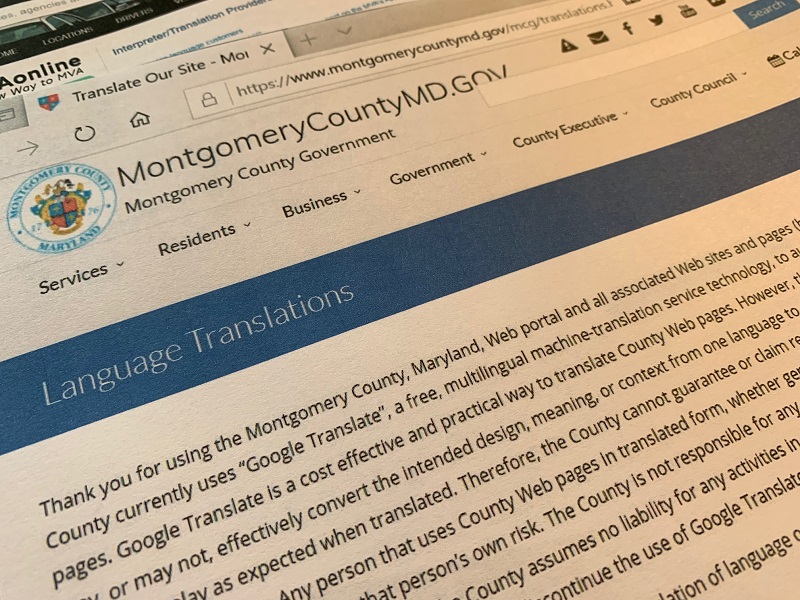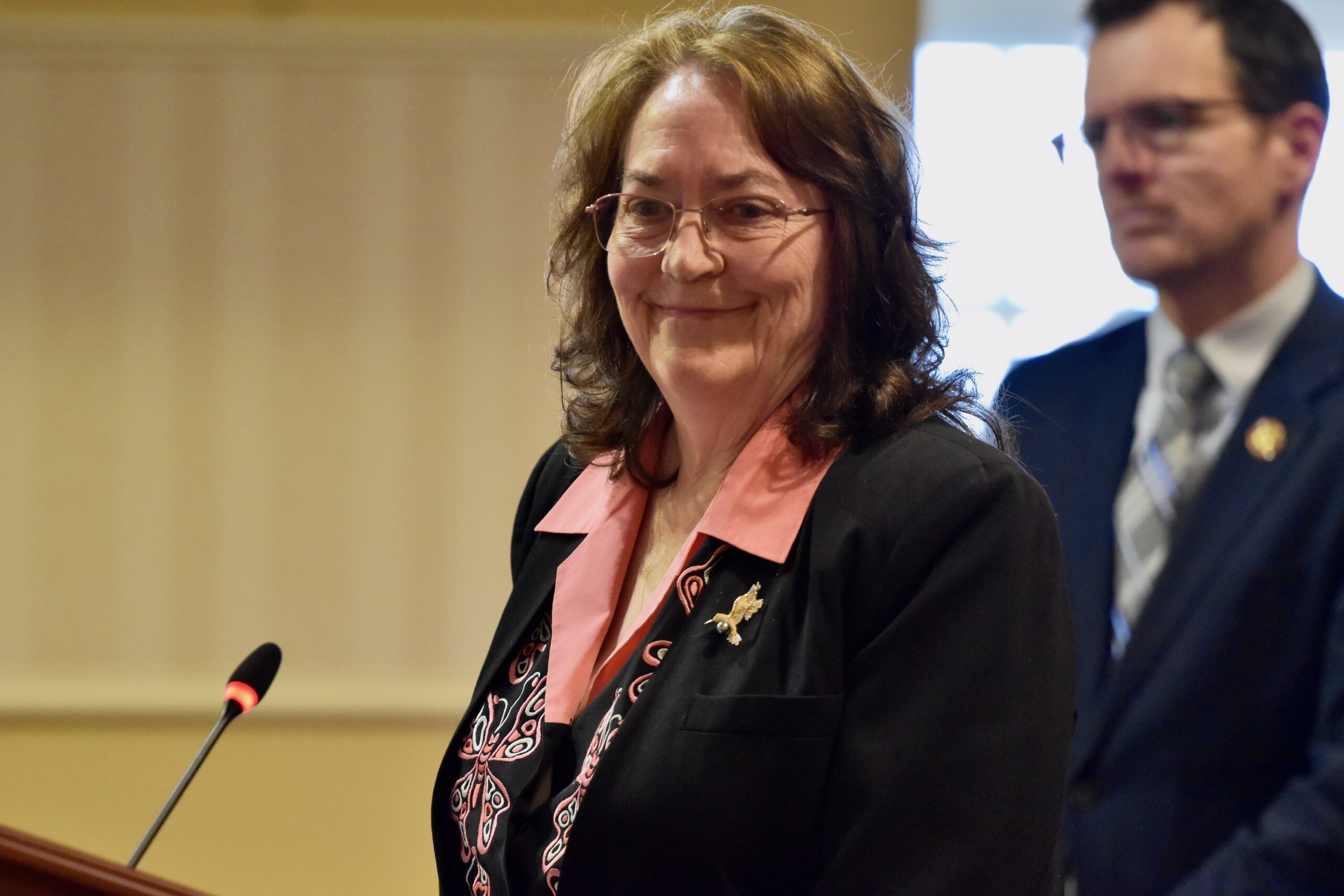Mixed Reviews on Efforts to Make Government More Accessible to Non-English Speakers

An English speaker researching affordable housing in Montgomery County might turn to the Department of Housing and Community Affairs’ website, where the information is generally clear despite some acronyms like “MPDUs.”
But to a speaker of Amharic – the lingua franca of the area’s large Ethiopian immigrant population – the translation provided offers a word that is closer to “family planning” than “housing.”
“An Amharic speaker might think they’re talking about birth control,” said Ermiyas Mengesha, a board member of Tayitu Cultural and Educational Center, which showcases Ethiopian and other African cultures.
With Maryland ranked in the top 10 most diverse states in the nation, and immigrants continuing to pour in, the state and many county governments are trying to make their websites more accessible to non-English speakers, with what some advocates describe as mixed success. All of the state’s executive-branch agency and department websites provide a translation button, according to the state’s Department of Information Technology, in compliance with a 2016 state law.
Meanwhile, half of the state’s 24 jurisdictions have chosen to translate some or all of their websites into one or more languages.
“I’m really proud of the message of inclusion,” said Sen. Cheryl C. Kagan (D-Montgomery), who sponsored the 2016 law mandating translation of state agency websites. “Especially in these days of [President Donald] Trump and division, this is such a welcoming contrast: We want you here.”
Imprecise, confusing programs
The state and most counties use Google Translate, which officials say allows them to provide access to as many as 103 languages for free. But some advocates say translation software can be imprecise, confusing and frustrating. They would like a more human touch.
Software programs offer literal translations, which are often not accurate, Mengesha said.
So, while an English speaker might say someone is “running for office,” the Amharic speaker might picture a person literally running.
“This is very benign,” he said, “but the errors on the website run deeper than this.”
As he browsed through several pages of Montgomery County websites recently, Mengesha, a native Amharic speaker, had to change the language to English in order to understand what the Amharic translation was trying to say.
This spring, Montgomery County posted a survey seeking public input as part of its search for a new police chief, Mengesha said. “The Amharic version was totally ridiculous,” he said. “It had the words ‘police,’ ‘chief,’ and at some point said ‘sheriff,’ but the main message was not there. It was like a word salad – a bunch of things.”
Accurate translation also requires cultural understanding, to avoid potentially offensive language, he said.
“There’s a conspiracy theory in Ethiopia that the government is sterilizing some minority groups with family planning,” he said. “I am surfing here on the Montgomery County housing department website, which is solely for finding information on housing, and while there, I am confronted with this family planning issue. The government has not intentionally done that. They have good intentions, trying to make things convenient. But the language happens to be offensive, not helpful.”
In April, Mengesha discussed government website mistranslations at a “confluence” conference at Montgomery College. His Powerpoint, which placed the original English and its Amharic translation side-by-side, left translators and interpreters shaking their heads.
A Montgomery County spokesman did not comment. But Patrick Mulford, communications director for the Maryland Department of Information Technology, wrote in an email to Maryland Matters: “The Department of Information Technology is using Google Translate because it is the most effective and efficient way for constituents to be able to access, and us to manage, our websites and the thousands of pages of rich content in their native language.”
No ‘silver-bullet answer’
Maryland is “a state that’s relatively progressive, that actually wants to meet the demand” to make government more accessible to limited-English speakers, said Stella Rouse, director of the University of Maryland’s Center for American Politics and Citizenship and an associate professor of government and politics. “It is a challenge. There’s not a silver-bullet answer.”
Maryland is one of the most diverse states in the U.S., with racial minorities comprising 49.1 percent of the population, according to a January 2019 report by the Department of Legislative Services’ Office of Policy Analysis.
The increase in the state’s population from 2000 to 2017 “has been entirely due to the growth in racial minority groups.” The state’s fastest-growing ethnic groups are the Hispanic community, which grew by nearly 170 percent, and the Asian population, which increased by 87 percent, from 2000-2017, according to U.S. Census data cited in the report.
Many members of minority groups moving into the state are U.S. citizens and native English speakers. But nearly 40 percent of foreign migrants entering Maryland who were surveyed identified themselves as “speak[ing] a language other than English, [and] speak[ing] English less than ‘very well,’” according to the 2009 -2013 American Community Survey – Migration Data posted by the Maryland Department of Planning’s State Data Center. And 9.5 percent of all migrants to the state who were surveyed, including those arriving from within and outside the U.S., classified themselves as speaking English “less than ‘very well.’”
A spokesman for the Department of Planning cautioned that the ACS has a wide margin of error, in this case about 8 percent, and noted that what constitutes speaking English “less than ‘very well’” is open to the interpretation of the respondents.
Maryland residents speak more than 100 languages and include people from 160 countries, according to the Department of Legislative Services.
State and local government websites offer the public information about public safety, health, education, obtaining a business loan or driver’s license, voting, tourism and more. But some neighboring states have not gone as far as Maryland. In Virginia, West Virginia and Pennsylvania, some agencies’ websites are translated, while many others are not. The District of Columbia’s website is not translated, but its Office of Human Rights has a language access program that offers interpretation services and translated documents.
Delaware government websites offer translation into eight languages and a link to Google translate. Like Maryland, Delaware offers a disclaimer that includes: “Some pages may not be accurately translated due to the limitations of the translation software.”
Room for improvement
Maryland has taken a good first step, but there is room for improvement, said Julio Murillo, government and strategic relations specialist with CASA de Maryland. Google Translate has its weaknesses, but state and local governments generally are good about translating fliers and public events. However, residents who want to dig deeper into an issue — such as housing code, starting a business or getting a permit — often get stuck, he said.
“When you get to the nitty-gritty of the steps you have to take, or what you have to do to get a permit, those tend to be in English,” he said. “That’s where folks may hit a barrier. When those details are not in a language you’re comfortable with, it can stymie the process. People may be embarrassed and stop engaging.”
Murillo said he works closely with Spanish speakers interested in housing code enforcement. They often want to know their rights and what constitutes a violation.
“That’s where they have language access trouble,” he said.
Kagan said the law exempted pdfs and videos from the translation requirement, and adopted the use of Google Translate, to make providing access practical and affordable.
“This is an example of when the perfect is the enemy of the good,” Kagan said. “It’s more important that people have access to state government than that we get every little bit” translated perfectly. A key was doing it for free, she added. “We’d never have got it passed if we said you have to hire people.”
Kagan said 86 percent of the state’s websites were only in English before the law passed three years ago. Even then, it took several years to implement and required additional clarifying legislation. Kagan said she was pleased to discover that a state Department of Education website about evaluating the safety of child care centers and Maryland Higher Education Commission information about obtaining student loans now include translation options; they did not when she checked several months ago.
All of the state’s executive departments now have the translate button on their websites, said Mulford of the state’s IT office.
Both Kagan and Mulford said they have had no feedback from constituents about the use of Google Translate or the accuracy of the translations.
Community outreach
Even in progressive states like Maryland, there is no consensus about providing translations, said UMd associate professor Rouse.
“Whose responsibility is it to provide that service?” Rouse asked. “Is it the state’s responsibility? Groups that work with immigrants? Oftentimes they provide a lot of translation services. Or is it the individual’s? You always get that response from a lot of people: Come here and learn the language – even though we don’t have an official language in the U.S. or in Maryland.”
Murillo said CASA would like to see Maryland follow the example of the language access programs in Prince George’s and Montgomery counties and Washington, D.C., which include community outreach to make residents aware of the service or have individuals within agencies who take translation and interpretation requests.
To Mengesha, if government is going to offer translation services, it should be done right or not at all.
“Montgomery County prides itself as inclusive. They promote themselves as having language access,” he said. “This is how they’re trying to portray themselves to the public, but this is a failure to me. It is good to have it. But once you start to have an effort to be sort-of inclusive, go a little further and make it accurate.”
Lisa Nevans Locke is a freelance writer who has covered education, local and federal government, and other issues in the region for more than 25 years. She has written for The Washington Times, Bethesda Magazine, Scholastic.com, The74million.org and the now-extinct Montgomery Journal, and she teaches writing at Montgomery College.
She can be reached at [email protected].
Did someone forward this to you?
Get your own daily morning news roundup in your inbox. Free. Sign up here.


 Creative Commons Attribution
Creative Commons Attribution